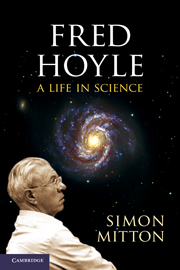Book contents
- Frontmatter
- Contents
- FOREWORD
- PROLOGUE
- 1 AN END AND A BEGINNING
- 2 TRAINING FOR COSMOLOGY
- 3 THE STAR MAKERS
- 4 HOYLE'S SECRET WAR
- 5 THE NATURE OF THE UNIVERSE
- 6 LIVES OF THE STARS
- 7 CLASH OF TITANS
- 8 ORIGIN OF THE CHEMICAL ELEMENTS
- 9 MATTERS OF GRAVITY
- 10 MOUNTAINS TO CLIMB
- 11 THE WATERSHED
- 12 STONES, BONES, BUGS AND ACCIDENTS
- ACKNOWLEDGEMENTS
- NOTES
- BIBLIOGRAPHY
- INDEX
- Plate Section
11 - THE WATERSHED
Published online by Cambridge University Press: 03 May 2011
- Frontmatter
- Contents
- FOREWORD
- PROLOGUE
- 1 AN END AND A BEGINNING
- 2 TRAINING FOR COSMOLOGY
- 3 THE STAR MAKERS
- 4 HOYLE'S SECRET WAR
- 5 THE NATURE OF THE UNIVERSE
- 6 LIVES OF THE STARS
- 7 CLASH OF TITANS
- 8 ORIGIN OF THE CHEMICAL ELEMENTS
- 9 MATTERS OF GRAVITY
- 10 MOUNTAINS TO CLIMB
- 11 THE WATERSHED
- 12 STONES, BONES, BUGS AND ACCIDENTS
- ACKNOWLEDGEMENTS
- NOTES
- BIBLIOGRAPHY
- INDEX
- Plate Section
Summary
By early 1971, the problem of continuing funding for the Institute of Theoretical Astronomy (IoTA) had become critical. As we have seen, the Nuffield Foundation and the Science Research Council (SRC) had agreed to bear the lion's share of the running costs (80 per cent) until 31 July 1972, at which date it was assumed the University of Cambridge would take full responsibility for the salaries. Of course, there would have to be a limit as to how much the university could afford for the support of astronomy and astrophysics.
From the teaching point of view, the radio astronomers in the Cavendish provided physics lectures and laboratory classes for the natural sciences tripos, while the teaching officers at the Department of Applied Mathematics and Theoretical Physics (DAMTP) carried a large load for the mathematical tripos. The permanent staff of the observatories had graduate students but played no role in undergraduate teaching. This was not due to a lack of willingness on their part but simply reflected the fact that observational astronomers worked at night and in observatories overseas. Most of the Institute staff were on short-term research contracts and therefore were unavailable to support undergraduate teaching, although they had graduate students. In any case, the whole point of founding the Institute had been to free the best minds for research, which is partly why George Batchelor had opposed its foundation in the 1960s.
- Type
- Chapter
- Information
- Fred HoyleA Life in Science, pp. 277 - 292Publisher: Cambridge University PressPrint publication year: 2011



